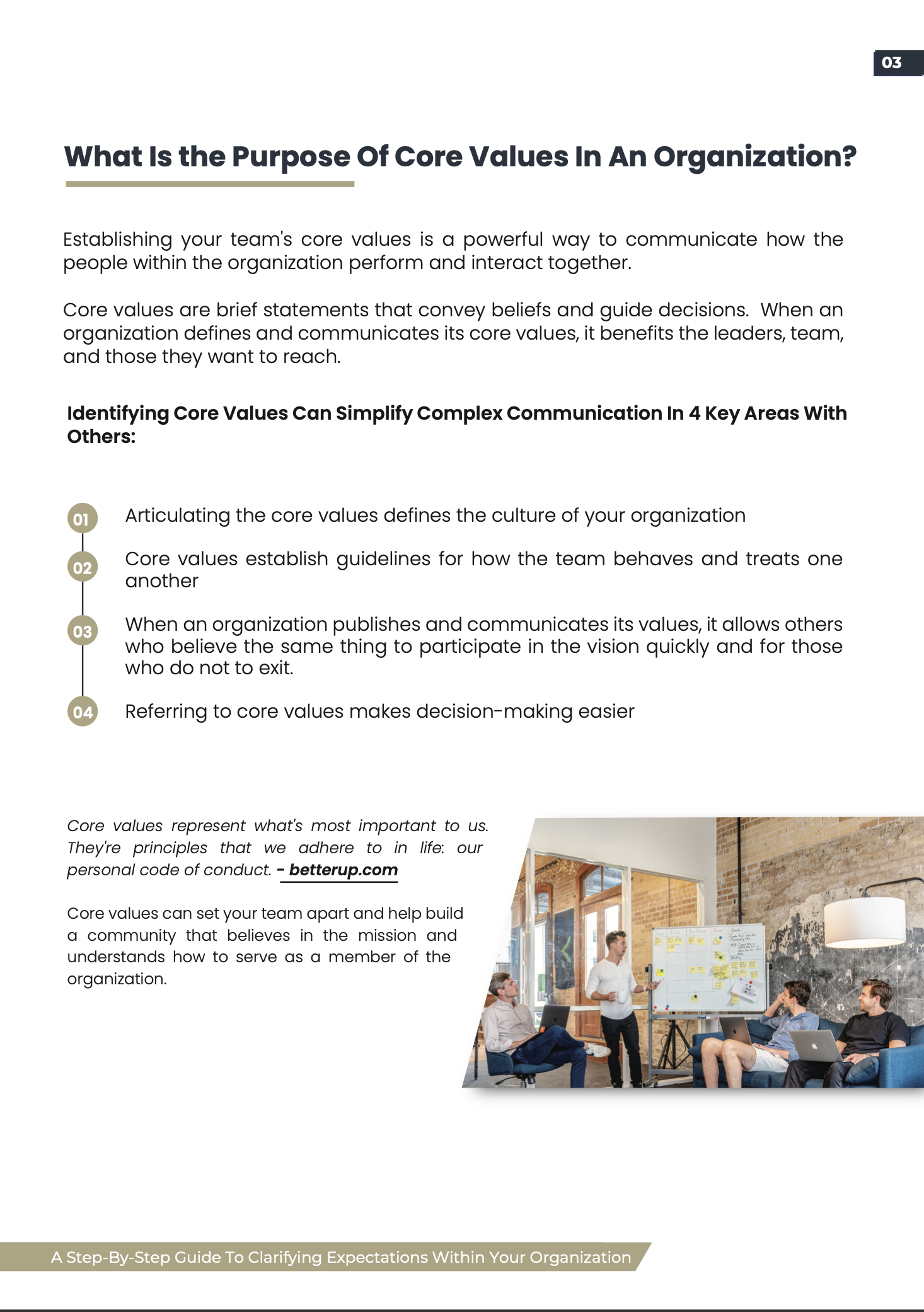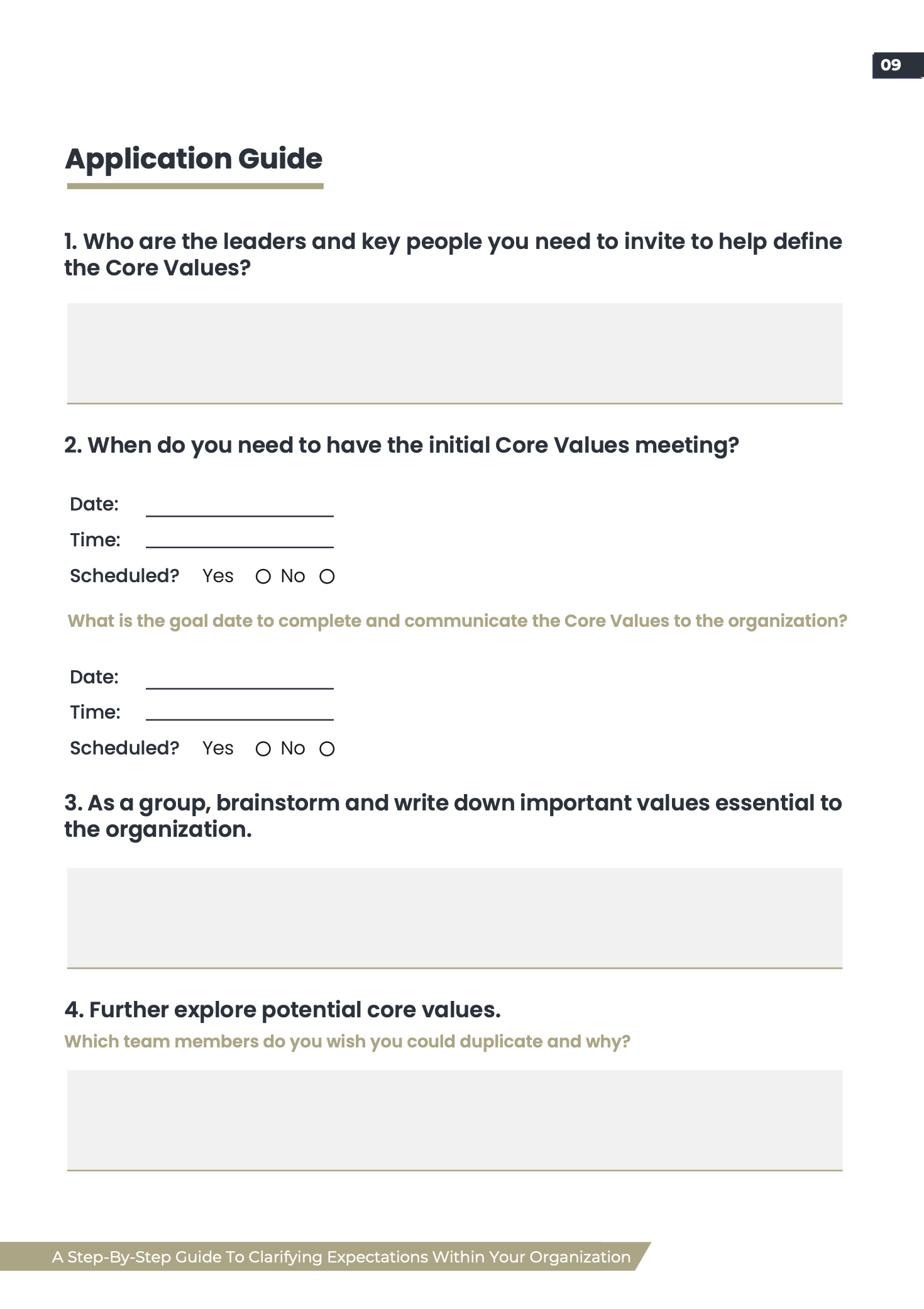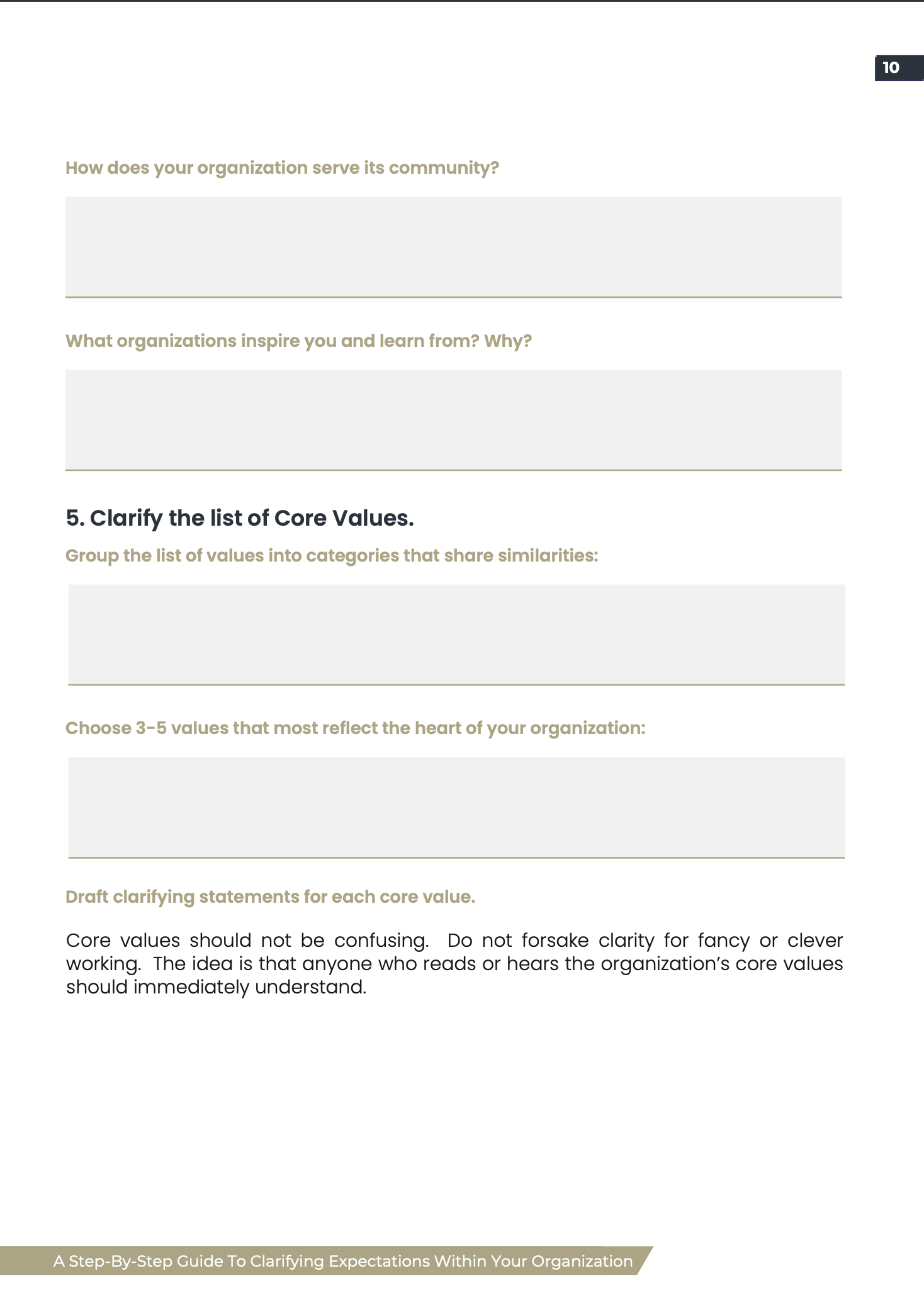Ready To Write Your Church’s Core Value Statements?
Creating core values for your church can feel daunting, especially when it’s unclear where to begin or how to make them resonate. Church Core Values Made Easy simplifies the process by guiding you through five actionable steps to clearly define your church’s values. This guide saves time and reduces stress by offering practical questions and insights, ensuring your values reflect your church’s unique mission. Whether you’re refining old values or starting fresh, you’ll walk away with core values that unify your team and inspire your congregation.
$14.97 for a limited time only
*By purchasing you agree to the Terms & Conditions
The Benefit Of Clear Core Values
When a church lacks defined core values, leaders can feel overwhelmed, facing conflicting priorities and unclear direction. Without these guiding principles, decision-making becomes challenging, leaving staff and volunteers uncertain about what truly matters. As a leader, you may feel the pressure of trying to unify your team while managing competing visions.
You want clarity. You desire a church where decisions are guided by purpose, where staff, volunteers, and congregants know what the church stands for. Clear core values not only unify but also guide your church’s direction. They provide a framework for decision-making, simplifying choices while ensuring alignment with your church’s greater mission.
Without defined values, your church might feel scattered. Perhaps you’ve had volunteers who didn’t fully understand your mission, or ministries that seem disconnected from your church’s core purpose. Establishing strong core values helps eliminate confusion, empowering leaders to make decisions that reflect the heartbeat of the church. With clear values in place, you’ll experience unity, focus, and a sense of shared vision across all areas of ministry.
By articulating your values, you create a foundation to enable growth, build trust, and keep your congregation aligned with the purpose for your church. These core values serve as the anchor that help keep your church on track, giving clarity to every decision, from programming to outreach, to leadership development.
Overview & Preview
Step By Step Guide Details
11 Pages
What Does It Cover?
✅ Complete Core Values Guide: Walk step-by-step through crafting values that align with your church’s mission, culture, and long-term goals.
✅ Structured Process: Follow a clear approach with actionable steps, from leadership involvement to refining your church’s unique values.
✅ Tailored for Leadership Teams: Includes prompts and exercises to engage key leaders, ensuring the values reflect your church’s true heartbeat.
✅ Get Instant Access! With immediate digital access, you can start training your team today. Print, email, or present the materials directly to your ushers.
Look Inside…
Get it Now!
Excellent if you’re a seasoned leader or a new volunteer who is ready to clarify the core values of your church. This walks you step by step toward creating clear statements that support your mission and inspire your team.
Core values provide a voice in the community and a language for communicating how your church operates. Identifying these values doesn’t have to be complicated, but it’s essential for guiding your team and aligning decisions.
As a church leader, balancing the expectations of elders, staff, and your congregation can feel overwhelming. Without clear principles, decision-making becomes harder, and your church’s message might feel scattered.
That’s where defining core values comes in. These values act as a compass, guiding your ministry and ensuring alignment. However, creating this list requires a thoughtful process—especially when everyone isn’t immediately on the same page.
To create a list of core values that help your church thrive, you must ask some basic questions. Answering these questions will help you identify the values that support the mission and shape the culture of your team.
But remember, establishing core values is more than just a task—it’s about defining what matters most to your church and how those values impact your congregation and community. Clear values offer a framework for communication, team behavior, and decision-making. Without them, churches often struggle with mixed messaging and an undefined culture.
If you’re an executive pastor or elder, you might already feel pressure to lead this process. But without full buy-in from the senior leadership—particularly the lead pastor—progress can stall.
As Patrick Lencioni wisely states, The best values efforts are driven by small teams that include the CEO, any founders who are still with the company, and a handful of key employees.
In church terms, this means your lead pastor and key ministry leaders must be involved. Without their commitment, core values risk being just another document collecting dust. Ensure the senior leadership is ready and committed to defining and sharing the core values, or else the process may lack the impact it needs to succeed.
For example, consider how a church without core values might struggle with decision-making. When values aren’t clear, teams might not know how to prioritize or address conflicts, leading to a lack of cohesion. On the other hand, a church that defines community, discipleship, and service as core values will likely make decisions that reflect those priorities, such as investing more in outreach programs or creating spaces for fellowship.
By establishing values, you give your church a foundation that helps it thrive spiritually and operationally.

Core Values vs. Vision & Mission: The Key Differences
Core Values form the bedrock of your church’s identity, defining how your congregation behaves, operates, and interacts with the community. They are the guiding principles that inform decision-making and behavior.
On the other hand, a mission statement answers the question, What are we doing now? It focuses on the church’s present activities and daily purpose.
A vision statement looks ahead, answering Where are we going? It outlines the future aspirations of your church, built upon the firm foundation of core values.
In short:
- Core Values = Guiding principles
- Mission = Current purpose
- Vision = Future goals
Together, these elements work in harmony to create a unified direction and key messaging for your church.

Is Your Church Drifting? Why Core Values Help Anchor People To The Mission
Establishing core values does more than create guidelines—it anchors your church to its mission. These brief, yet powerful, statements shape how members interact, lead, and make decisions, ensuring your church stays aligned with its vision.
Core Values Clarify Four Key Areas:
- Church Culture: Defines how your church operates at every level.
- Team Behavior: Sets clear expectations for leadership and volunteer engagement.
- Decision-Making: Streamlines choices that align with the mission.
- Community Building: Encourages participation from those who share and embrace the church’s values.
Core values represent what’s most important to us. They’re principles that we adhere to in life: our personal code of conduct. – betterup.com
Core values articulate what matters to your church and help create a community that deeply connects with the mission. These values guide members in how the team and body interacts when it is together so that actions align with the church’s purpose.

5 Steps to Define Your Church’s Core Value Statements
Now that we’ve explored why church core values matter, it’s time to create or refine yours. Follow these five practical steps to clarify your church’s core values, ensuring they guide your mission, shape your culture, and unite your team.
1. Start with the Right Team — Involve Your Lead Pastor and Invite Core Leaders
Start by gathering the lead pastor and a small group of key leaders (5-8 people is ideal). The most meaningful discussions happen within a smaller, dedicated group that understands the church’s mission and drives decision-making. By including those invested in the church’s future, you can ensure the core values reflect the heart of the ministry and create alignment from the top down. This involvement is crucial for gaining buy-in and fostering long-term commitment to the process.
2. Set Clear Expectations and Timeframes for Developing Core Values
Allow adequate time to complete the process thoughtfully. Set a clear deadline (two months or less) to finalize your church’s core values, emphasizing reflection and revision. Start with an initial brainstorming session to generate ideas, followed by regular, focused meetings for discussion. Aim to meet twice a week during the first few weeks, then adjust frequency as needed until the values are fully formed. This approach ensures ongoing engagement and allows time for refinement.
3. Group Brainstorm: Identify Key Values Together
Facilitate a brainstorming session where each leader writes down values they believe are essential for your church. Use a whiteboard, sticky notes, or digital tools to capture everyone’s input. Encourage openness and collaboration by allowing space for reflection and discussion. This process should yield a broad list of potential core values that can be refined and narrowed down in later sessions.
4. Ask Thought-Provoking Questions to Explore Core Values
To truly define the core values that drive your church, you’ll need to ask meaningful questions about your church’s identity and mission. Reflecting on what motivates your congregation and leadership will reveal values that aren’t just aspirational but are actively guiding decisions, behaviors, and ministry efforts. Thoughtful, introspective questions are essential in pinpointing the principles that shape your church’s culture and align your team around a unified mission.
Who is a volunteer or team member that you wish you could duplicate?
Think of this person and pinpoint what makes them so valuable and why you appreciate them so much—identifying what makes this person special can reveal values that are meaningful to you.

In what ways does your church serve the community?
Does your church lead mission trips to help impoverished communities? Do you heavily invest in missionaries or church planting? Is NexGen ministry a priority or point of focus? Considering how your church engages in service can help illustrate essential core values.
Identifying areas with strong engagement and passion can clarify additional values. Some other types of community engagement could include:
- Clothing drives
- Family events
- Evangelism
- Discipleship or Bible Study
- Worship events
Your team must be 100% honest at this point. If your team struggles to identify your church’s outreach efforts, note that this should become an aspirational value.
It is essential to distinguish between core values and aspirational values. Core values already exist within the organization and are supported with action and resources. Leaders must build aspirational values with time, budget, and vision.
What churches do we learn from and inspire us?
What aspects of these churches do you admire? Is it their level of creativity? Does their teamwork motivate you to be a better leader? Whatever it is, consider if there are similarities between both churches and articulate why these values inspire you.
Don’t copy another church’s list, but let it inspire you. Find ways that you are similar or different from other churches and discuss why. You will find behaviors, beliefs, and ways your church is unique.
Allow key volunteers and trustworthy members of the church to have input?
Asking a small focus group of faithful people to share what values they believe the church most exemplifies can be a worthwhile exercise.
Knowing that pastors and leaders consider and care about their input can result in long-term relationships and fruit. You can gain great insight from church members by asking about their perspectives and thoughts. Plus, opening this conversation up with the right individuals can create tremendous buy-in after sharing the final version of the core values.
5. Refine and Finalize The List of Core Values
Now it’s time to refine your core values into a clear, final list. Follow these steps with your leadership group to solidify your church’s values:
- Organize by Categories: Group similar values together for clarity.
- Prioritize Key Values: Narrow it down to 3-5 core values that best reflect your church’s heart.
- Write Clear Statements: Avoid confusing or overly clever wording—ensure that each value is easy to understand.
Core values should not be confusing. Do not forsake clarity for fancy or clever writing. The idea is that anyone who reads or hears the church’s core values should immediately be able to understand them.
After refining and agreeing upon the final version from the top-down, it is time to communicate them. It’s a good idea to put the core values on your church website and strategically post them around your church building for others to see. Your church’s core values should be reviewed as often as possible by sharing them during meetings, leadership training, and assimilating new church members.

Church Core Values Examples
5 Exceptional Examples Of Church Core Values
- Love is the context for all missions. – Mosaic Church
- We honor one another to glorify God. –Elevation Church
- Generosity is Our Privilege. –Queen City People
- We, as a church, believe that we can accomplish more together than apart! – Church on Fire
- We are spiritual contributors, not spiritual consumers. – Life Church
These examples are from a list of core values each church has crafted to support the culture and mission of its team. These ideas should help you come up with your list as well.

What Are Some Core Values Of A Healthy Church?
A church with healthy core values and a clear mission statement will have a strong sense of identity and community. Some popular values of a healthy church include:
- Outreach
- Worship
- Excellence
- Honesty
- Gratitude
- Community
You can then translate these simple core values into your core value statements. Below are statements using the values above that you can use to help you draft your own:
- “We give more than we take.”
- “Our church and our mission centers around Christ and his teachings.”
- “We bring our best in all that we do.”
- “Our honesty sets us apart.”
- “We are grateful for the community we live in.”
- “We value and treat others with respect.”
Your values statements should communicate what you believe in and can even act as an invitation for others to join in upholding the same beliefs. They can also provide your current church members a framework for interacting as a congregation.
Bring Your Core Values to Life
Your church’s core values are more than just statements—they are a guide to action and culture. When consistently modeled by leaders and embraced by the congregation, they become the foundation for every decision, relationship, and ministry. Crafting clear, actionable values creates alignment between your vision and daily operations, setting a strong example for everyone involved.
Remember, the real impact comes when these values are lived out. Take the time to refine them, and you’ll create lasting unity and purpose in your church. Ready to simplify the process? Download the Core Values Made Easy Guide today and take the first step toward creating core values that truly reflect your church’s heart and mission.

Could you use more help in crafting and creating compelling messaging? Including your weekend sermons? Check out the following posts:
How To Write Compelling Church Vision Statements In 6 Simple Steps
How To Clarify Church Mission Statements In 5 Easy Steps
How To Prepare An Effective Message In 7 Steps
How To Prepare An Engaging Message (Sermon) Series In 4 Steps
Adaptable Leader Crash Course
Get the FREE 4-part email guide to help you become a more agile and empathetic leader in your ministry.









